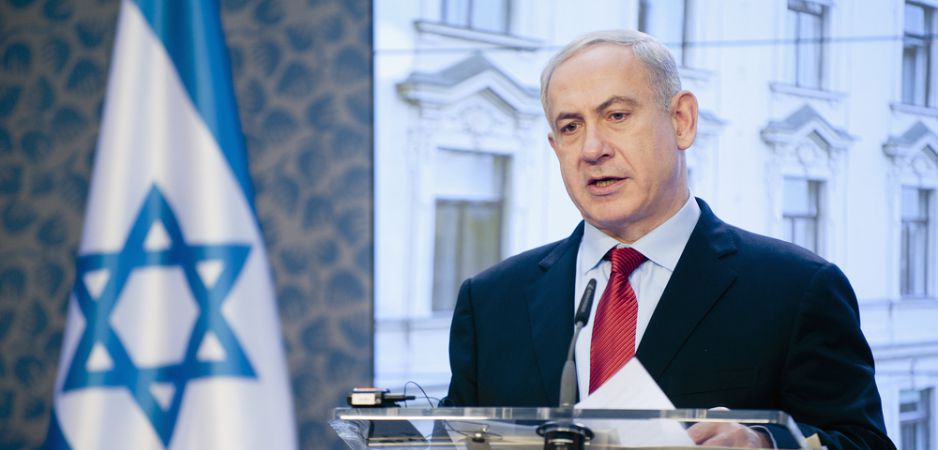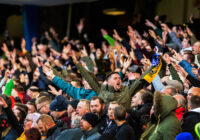Government investigations over Beitar Jerusalem and La Familia suggest that Israel might seriously tackle racist soccer fans.
Israel is struggling with groups linked to a banned nationalist party. The movements in question are at the forefront of racist, anti-Palestinian incidents. These include a militant soccer fan group, which was responsible for violent clashes in July during a UEFA Europa League match in Belgium between Israeli club Beitar Jerusalem and Charleloi SC.
Two government investigations of Beitar Jerusalem and La Familia—the soccer club’s notorious fan group that openly supports Kach, a banned party founded by Meir Kahane, an extremist rabbi who was assassinated in 1990—took on added significance after Israel’s internal security service, Shin Bet, said it had no grounds to ban Lechava (another Kach support group) on the grounds of terrorism.
Shin Beit’s decision and the investigations have moved to center stage amid racist and discriminatory attacks such as the firebombing of a Palestinian home that killed an 18-month-old baby, Ali Dawabsheh. The wave of incidents also include the stabbing of participants in a gay pride parade by a Jewish ultra-Orthodox repeat offender, as well as allegations that Israel discriminates against its dark-skinned Jewish citizens—particularly those who trace their roots to the Horn of Africa.
Israel responded to the firebombing of the Dawabsheh family’s home by authorizing Shin Bet to employ “special interrogation methods” in cases of Jewish perpetrators of political violence that, until now, were generally reserved for Palestinian detainees. These measures allow for Jewish suspects to be put into administrative detention without trial—another punitive act that in the past was largely applied to Palestinians.
Israeli leaders have condemned the firebombing as an act of terrorism and are keen to stop elements of the Jewish underground from threatening the fabric of Israeli society by escalating Israeli-Palestinian tensions.
Israel also wants to ensure that racist incidents do not pour grist on the mill of the growing boycott, divestment and sanctions (BDS) movement, which seeks to isolate Israel internationally, or revive efforts by the Palestine Football Association (PFA) to get FIFA to suspend Israel’s membership to the soccer body on the grounds of racism.
While FIFA has bigger fish to fry with its major corruption scandal, it agreed in May to establish a committee to monitor Israeli progress in addressing Palestinian concerns, in exchange for the PFA dropping its suspension demand. The committee is supposed to regularly report back to FIFA’s executive committee.
Israel’s success in defeating the PFA effort is instructive in judging its overall effort to combat racism, as well as resolve the Israeli-Palestinian conflict. When the chips were down, Israel proved that it could muster the political will to take steps it had earlier rejected on security grounds.
In talks with FIFA President Sepp Blatter in May, Israeli Prime Minister Binyamin Netanyahu proposed giving Palestinian players special identity cards and placing sports liaison officials at crossings between Palestinian areas and those under Israeli control to ease movement. Netanyahu further suggested a special escort service between Gaza and the West Bank to allow soccer players to cross between the two Palestinian territories.
A visit this week to Gaza by a West Bank team constitutes the first time Israel has allowed the passage for a competition match in 15 years. It appears to be a step toward implementation of Netanyahu’s promises. A further indication will be whether the Gaza team, Al Shejaia, will be allowed to travel to the West Bank for the return Palestine Cup match on August 9 against Hebron’s Al Ahli. The winner would play in the next Asian Football Confederation (AFC) Cup.
The Gaza match was originally scheduled for August 3, but it was postponed until August 6 because Israel had, according to the PFA, blocked Al Ahli’s travel. Palestinian officials said that if Israel followed through on Netanyahu’s promises, it could lead to reunification of the Palestinian league.
A Wake-Up Call For Israel?
While soccer racism was not raised by Blatter at the time, the two Beitar- and La Familia-related investigations could also be part of the Israeli effort. The investigations potentially suggest that Israel will seriously tackle racist soccer fans.
The IFA, the only Middle Eastern soccer association that, at least nominally, has an anti-racism project, has until now done little more than slapped Beitar’s wrists for refusing to hire Palestinians who rank among Israel’s top players or discipline its militant fan base.
La Familia regularly raises the Kach flag, most recently in the July incident in Belgium, where it fluttered next to the Israeli flag. The incident sparked outrage in Israel because it tarnished the Jewish state’s image. Kach was banned in 1994, after it endorsed the killing of 29 Palestinian worshippers in the Cave of the Patriarchs in Hebron by a member of the Jewish Defense League, a Kach predecessor.
Earlier this week, Shin Bet arrested and put into administrative detention Meir Ettinger, the 24-year-old grandson of Rabbi Kahane. Ettinger, who is believed to be a leader of a Kach-related radical settler youth underground, has denied allegations that he was responsible for the torching of the landmark Church of the Multiplication of the Loaves and Fishes on the Sea of Galilee in July.
“The truth must be told—there is no terror organization, but there are a whole lot of Jews, a lot more than people think, whose value-system is completely different than that of the High Court or the Shin Bet, and who are not bound by the laws of the state, but by much more eternal laws, true laws,” Ettinger wrote in a blog post days before his arrest.
In a manifesto in 2013, Ettinger declared:
“The idea of the rebellion is very simple. Israel has many weak points, many issues which it handles by walking on eggshells so as to not attract attention. What we’re going to do is simply fire up these powder kegs. The aim is to bring down the state, to bring down its structure and its ability to control, and to build a new system. To do it, we must act outside the rules of the state we seek to bring down … At the end of the day, the goal is to shake up the foundations of the state until we have a situation in which Jews must decide whether they are part of the revolution or part of the repression.”
In July, two members of Lechava were sentenced to prison for torching a school operated by Hand in Hand, an organization that operates schools attended by both Israeli Jewish and Israeli Palestinian students.
Israel has yet to make any arrests related to the firebombing of the Dawabsheh family’s home. Ettinger’s youth group, which is believed to be made up of adolescent offspring of Jewish settlers in the West Bank, is suspected of responsibility for the attack.
“Every society has its radical fringes. But today we need to ask ourselves: What is it in the public atmosphere that allows extremism and extremists to walk freely in broad daylight?” Israeli President Reuven Rivlin asked at a rally to denounce the firebombing.
Writing in Al-Monitor, Israeli journalist Shlomo Eldar noted that the attack had been “made possible by the ineptness of the Israeli law enforcement agencies in the [occupied] territories as well as the patent and outright discrimination against Palestinians in favor of the settlers.”
How the Israeli government handles not only of the underground, but also other militant anti-Palestinian groups like Beitar Jerusalem’s La Familia will serve as an indication of whether the firebombing and the soccer brawl in Belgium constitute a wake-up call for Israel.
The views expressed in this article are the author’s own and do not necessarily reflect Fair Observer’s editorial policy.
Photo Credit: Yakub88 / Shutterstock.com
 We bring you perspectives from around the world. Help us to inform and educate. Your donation is tax-deductible. Join over 400 people to become a donor or you could choose to be a sponsor.
We bring you perspectives from around the world. Help us to inform and educate. Your donation is tax-deductible. Join over 400 people to become a donor or you could choose to be a sponsor.
Support Fair Observer
We rely on your support for our independence, diversity and quality.
For more than 10 years, Fair Observer has been free, fair and independent. No billionaire owns us, no advertisers control us. We are a reader-supported nonprofit. Unlike many other publications, we keep our content free for readers regardless of where they live or whether they can afford to pay. We have no paywalls and no ads.
In the post-truth era of fake news, echo chambers and filter bubbles, we publish a plurality of perspectives from around the world. Anyone can publish with us, but everyone goes through a rigorous editorial process. So, you get fact-checked, well-reasoned content instead of noise.
We publish 2,500+ voices from 90+ countries. We also conduct education and training programs
on subjects ranging from digital media and journalism to writing and critical thinking. This
doesn’t come cheap. Servers, editors, trainers and web developers cost
money.
Please consider supporting us on a regular basis as a recurring donor or a
sustaining member.
Will you support FO’s journalism?
We rely on your support for our independence, diversity and quality.







Comment